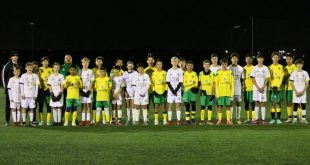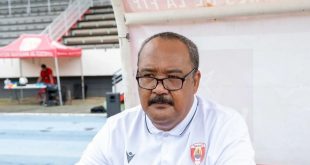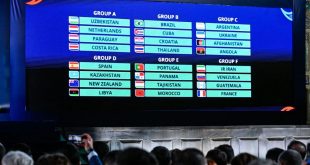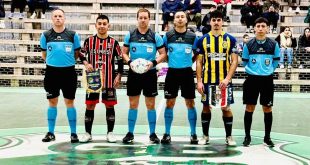 Hosting the Women’s Olympic Football Tournament-Oceania Qualifier has provided Samoa a glimpse into the future of the sport in the country.
Hosting the Women’s Olympic Football Tournament-Oceania Qualifier has provided Samoa a glimpse into the future of the sport in the country.
A revolution is underway into how the game is administered and developed in the Pacific Island nation of some 225,000 people.
Thanks to investment from FIFA and support from Oceania Football Confederation, Football Federation Samoa (FFS) will relocate its headquarters from Tuanaimato to nearby Apia Park later this year. The sparkling new facility will house the Administration, Finance, CEO, Media and Marketing departments, and the building will include up to three futsal courts. It will be multipurpose with the FFS able to hire it out for sports like basketball and volleyball.
Three football pitches are also being developed at the site, with plans to complete two this year. The venue is closer to the local clubs and will include quality lighting, multiple changing rooms, and corporate facilities.
The current FFS headquarters will be developed into a High-Performance Centre and include an Academy, a refurbished futsal court, a gym, an anti-doping facility and accommodation.
Football Federation Samoa President Sam Petaia says FIFA’s investment of more than $5 million USD for infrastructure has made the project possible.
“We started with the Goal projected and moved to FIFA Forward 1.0, then to FIFA Forward 2.0 (The Apia Park facility) and are about to start FIFA Forward 3.0. (The Academy project) So basically, 1.0 was the refurbishment of the whole stadium here (2019). 2.0 started in 2021 with the Apia Park project. Covid slowed things down, but we are getting there, and its 80 percent completed and just the finishing touches are left.” Petaia said.
“So everything to do with High Performance, setting up an Academy, the technical side of the game. This will be based here (current headquarters) and headed by our technical director.”
Petaia hopes that project, which has been approved, will start once FIFA Forward 2.0 is completed later this year.
“The quicker the funds are released, the earlier we can start. Part of FIFA 3.0 includes the installation of floodlights to field number two, and the refurbishment of the futsal court. So those were all covered under the FIFA Forward 3.0.” Petaia explained.
Petaia is determined to see football ultimately challenge Rugby Union’s dominance in Samoa.
“FIFA, through their infrastructure assistance, have given us a platform, that our Federation can challenge rugby. I mean, we have a partnership with the rugby team. So, the international (sevens) teams that come in, they use our facilities to train on, and it’s something that FIFA has agreed to. We, work in collaboration with them. But the FFS is has the most well-funded, and the most popular grassroots programme in the country.” Petaia said.
“The challenge we have is when they transition from primary school to secondary school, that’s where we tend to lose a lot of the football players, because they tend to go to rugby. So, we have to have systems in place that we will make sure we try to hold onto our players, so they know there’s something for them when they leave primary school. It’s about us building programmes we can sustain. In five to 10 years look out, that landscape can change.”
That’s where new FFS Technical Director Ravinesh Kumar comes in. Kumar was Fiji’s Technical Director from 2014 to 2020 before heading the coaching programme at the Papakura Club in New Zealand.
Kumar took up the Technical Director role in Samoa in November and is relishing the opportunity to develop a quality High Performance Unit.
The Samoan side that has performed so well at the Women’s Olympic Football Tournament-Oceania Qualifier, is made up of players with Samoan heritage from the United States, Australia, and New Zealand with just one local, goalkeeper Repeka Asofa Salele in the team. The players are proudly Samoan but the FFS recognise the need to develop home grown talent, providing an environment for them in Samoa to improve technically.
Kumar believes the launch of development programmes this year and the creation of the High-Performance Centre and Academy will be a game changer for football in Samoa.
“It will close the gap between participation performance and high performance. Infrastructure is one of the most important things in football development, if we do not have the correct infrastructure, any Federation will struggle. And I believe that FFS has got the right infrastructure. It needs a little bit of improvement, like the President has said, we are still in the FIFA 3.0 project to build the Academy accommodation for players, gym, and other facilities. That will be a great initiative. And it will help a lot of players in understanding the game and getting the good facilities to operate with.”
Kumar speaks passionately about the benefits a High-Performance football environment will bring.
“We are creating the performance and the high-performance pathways for the girls and boys, and we are creating a Center of Excellence in the regional academies for girls and boys locally. So, we can develop the identified girls, the elite girls from the clubs, and they will be having three days per week training here with coaches. That means they will be training in the centre of excellence. So, in time to come we will obviously see more of our local girls into the national teams. But we won’t eliminate players outside the country, they are still Samoan, and they are playing at a higher level with better competition outside.” Kumar said.
Samoa has capitalised on the success of the FIFA Women’s World Cup 2023 which was jointly hosted by New Zealand and Australia.
“Yes, I think the FIFA Women’s World Cup had a great impact on the young players, young girls as well. We had our holiday programs back in December, after school finished. We had an increased number of girls and boys attending those holiday programs. And we could clearly see that there is a link between the FIFA Women’s World Cup brought to Oceania creating interest among the local kids.”
Kumar sees opportunities for talented Samoan footballers to play offshore through relationships the FFS are building in New Zealand and Australia.
“We are creating this centre of excellence so that our players can find a club. I will not say at a professional level straight away, but to the next level, where New Zealand and Australia plays, or the state secondary school teams, we are creating the link with these countries and with organisations so that our players can go and train in those high-level competition teams.” Kumar explained.
“The programme will start this year through the help of the technical development scheme, (TDS) and in our centre of excellence for boys under 16, and under 16 Girls. We have approximately 30 players each and then the same in the regional academy program for the girls and boys so there are about 120 players going through this programme.” Kumar added.
Another key focus for Kumar and his team in Samoa is increasing the quality of coaching.
“If we want to develop better players or good players in Samoa, we need to have better coaches. And I’ve seen that their qualification level is at one level, they need to step up to the next level. And the next level for Samoa is the B license coach, whereas we see the other countries they have a lot of B license and A license coaches. So, the main aim for me will be to develop more and more coaches for the clubs and in the youth and grassroot teams. We will have a lot of coaching courses this year to develop our coaches for our teams.”
 Arunava about Football A look at football & the world through my eyes!
Arunava about Football A look at football & the world through my eyes!



